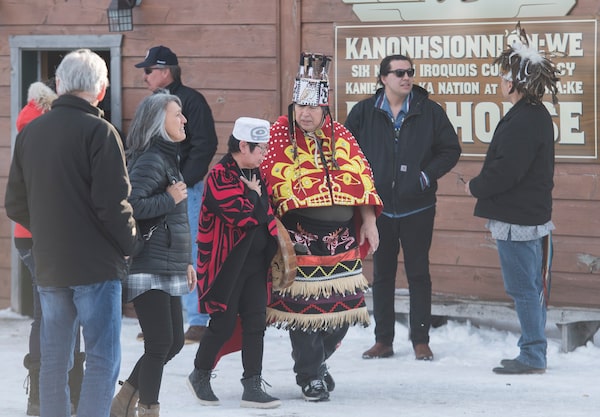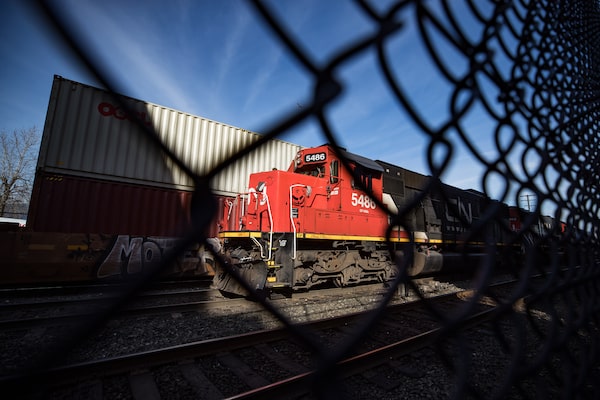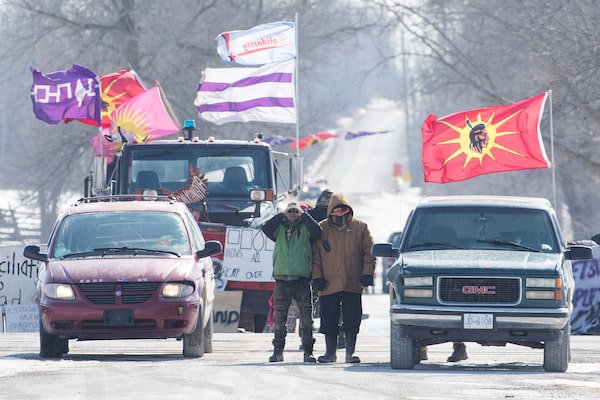
People leave a meeting between Wet'suwet'en hereditary chiefs and Mohawk leaders on the Kahnawake Mohawk Territory south of Montreal, Saturday, February 22, 2020.Graham Hughes/The Canadian Press
A day after the Prime Minister called for an immediate end to weeks-long rail blockades that are bruising the Canadian economy, protesters in Tyendinaga Mohawk Territory said they have no plans to move and a new demonstration sprung up along railway tracks in Saskatoon.
The Tyendinaga protesters have been camped out since Feb. 6 in support of Wet’suwet’en hereditary chiefs who oppose the passage of Coastal GasLink’s $6.6-billion natural gas pipeline through their traditional territory in northern British Columbia. Theirs and other demonstrations began after the RCMP enforced a court injunction against opponents of the pipeline project and arrested 28 people along a logging road near Houston, B.C.
‘It’s the people who decide’: Who’s leading the pro-Wet’suwet’en blockades, and who’s not
Indigenous supporters of Coastal GasLink speak out on the division and backlash
“We are just going to stay standing our ground until all our demands are met,” Andrew Brant, who is from the Tyendinaga Mohawk Territory, told The Globe and Mail on Saturday.
Ontario Provincial Police officers sat in an unmarked car on a road leading to the blockade, but did not move in to remove the small protest consisting of tents, a van and snow plow. Two marked police cars were also stationed at checkpoints. An OPP spokesman said their primary goal is “preserving the peace.”
“At this point in time, we’re monitoring the situation in terms of everyone’s safety, for those who are part of the situation at Wyman’s Road as well as for anyone who’s coming in or out of the site,” said Bill Dickson, media relations coordinator for the OPP in Eastern Ontario.
The demonstration near Belleville, Ont., has been the most economically disruptive of several rail blockades across the country, halting freight service on Canadian National Railway’s eastern Canadian network and leading to the suspension of most of Via Rail’s passenger trains. CN has obtained a court injunction against the protest.

CN Rail locomotives are moved on tracks past cargo containers sitting on idle train cars at port in Vancouver, on Friday, February 21, 2020.DARRYL DYCK/The Canadian Press
Wet’suwet’en hereditary chiefs met with members of the Tyendinaga Mohawk community on Friday to thank them for their support. On Saturday, the chiefs traveled to Kahnawake, Que., to visit the Mohawk community there. One of Montreal’s commuter train lines has been shut down by a blockade in the Kahnawake Mohawk Territory outside the city.
Meanwhile in Saskatoon, police were monitoring a protest along the rail tracks. A statement from the office of Saskatchewan Premier Scott Moe said a train was allowed to pass through the protest area as scheduled. The premier’s office said the protest must remain lawful and transport routes cannot be disrupted by illegal blockades. In Toronto, hundreds of people gathered at Queen’s Park on Saturday to support opponents of the pipeline.
The Wet’suwet’en hereditary chiefs spoke to the media on Friday, not long after Prime Minister Justin Trudeau adopted a sharp shift in tone, saying the rail blockades must be dismantled. The government noted repeated offers to meet with Wet’suwet’en hereditary chiefs have been ignored.
Canada's Prime Minister Justin Trudeau speaks to news media along with cabinet members, left to right, Minister of Public Safety and Emergency Preparedness Bill Blair, Deputy Prime Minister Chrystia Freeland, Minister of Crown-Indigenous Relations Carolyn Bennett, and Minister of Transport Marc Garneau in Ottawa, Ontario, Canada February 21, 2020.PATRICK DOYLE/Reuters
“Here’s the reality: Every attempt at dialogue has been made. The discussions have not been productive. We can’t have dialogue when only one party is coming to the table," Mr. Trudeau said.
In response, Wet’suwet’en hereditary Chief Woos, who also goes by Frank Alec, said the protests and blockades will continue until the RCMP and Coastal GasLink workers leave their traditional territory. Once these conditions are met, he said his people would be willing to engage in nation-to-nation talks with the B.C. and federal governments.
“We’re already at a point beyond frustration, it’s more like confusion,” the chief said Saturday. “Mr. Trudeau is saying it’s up to us, but we’re saying right from Day 1, RCMP vacate the area and then there’s going to be some talks and some possible paths forward on this situation right across the country.”
The B.C. RCMP have said they are planning to move a temporary police outpost in Wet’suwet’en to the nearby town of Houston, B.C.
At least two blockades in Quebec have come down since Mr. Trudeau’s comments. Riot police arrived Friday afternoon to enforce an injunction ordering protesters off Canadian National Railway tracks in St-Lambert, Que. Another small blockade set up near L’Isle-Verte, Que., on Wednesday was also dismantled late Friday, provincial police said. Neither protest was on Indigenous territory.
A group of police officers stand on the tracks as supporters of the indigenous Wet'suwet'en Nation's hereditary chiefs maintain a railway blockade as part of protests against British Columbia's Coastal GasLink pipeline, in St Lambert, Quebec, Canada February 21, 2020.CHRISTINNE MUSCHI/Reuters
The rail blockades have raised concerns about shortages of critical supplies of everything from propane to water-treatment chemicals, and put pressure on the federal government to find a solution to limit further economic damage. The protests have also stopped or slowed rail service at Canada’s four main ports, Vancouver, Prince Rupert, B.C., Montreal and Halifax, forcing ships to idle at anchor or divert to U.S. destinations.
Nearly 1,000 Via Rail employees and about 450 CN workers have been temporarily laid off as a result of the rail disruptions.
Ghislain Picard, chief of the Assembly of First Nations of Quebec and Labrador, attended Saturday’s meeting between the Wet’suwet’en hereditary chiefs and members of the Kahnawake Mohawk community. He said instead of putting the onus on Indigenous leaders, the federal government should do more to bring solutions to the table. He also questioned the silence of the promoter of the pipeline project.
“There’s also responsibility for Coastal GasLink, they’re the ones who will be pulling in billions of dollars from this project, why don’t they have anything to say?” Mr. Picard said. “Why wouldn’t they be the one to take the lead and say we’ll give the process a chance and stop working right now.”

A protester looks through a pair of binoculars at the closed train tracks in Tyendinaga, near Belleville, Ont., on Saturday Feb.22, 2020, at a rail blockade in support of the Wet'suwet'en who oppose work on a pipeline in northern B.C.Lars Hagberg/The Canadian Press
The Coastal GasLink pipeline would stretch across 670 kilometres, transporting natural gas to LNG Canada’s $18-billion export terminal, under construction in Kitimat, B.C. Royal Dutch Shell PLC leads the LNG Canada consortium, which aims to begin exports of liquefied natural gas to Asia in 2025.
All 20 elected First Nation councils along the pipeline’s route support the project. However, a group of Wet’suwet’en Nation hereditary house chiefs has led a vocal campaign to oppose the pipeline’s construction, saying hereditary leaders have jurisdiction over their unceded traditional territory located outside of federal reserves, not elected band councillors. About 190 kilometres of the pipeline route cross the Wet’suwet’en’s territory.
At the Tyendinaga demonstration, a counter protester turned up on Saturday to voice his frustration with the ongoing blockade.
Chander Datta, who lives in Kingston, said disruption to the supply of gas from the blockade has hurt his company, which has 170 employees and manufactures air-conditioning and refrigeration systems. “I think it’s important they get the message that there are other people who don’t like [the blockade],” he said, carrying homemade placards for his protest.
With reports from Canadian Press and Renata D’Aliesio, The Globe and Mail
Our Morning Update and Evening Update newsletters are written by Globe editors, giving you a concise summary of the day’s most important headlines. Sign up today.
 Karen Howlett
Karen Howlett